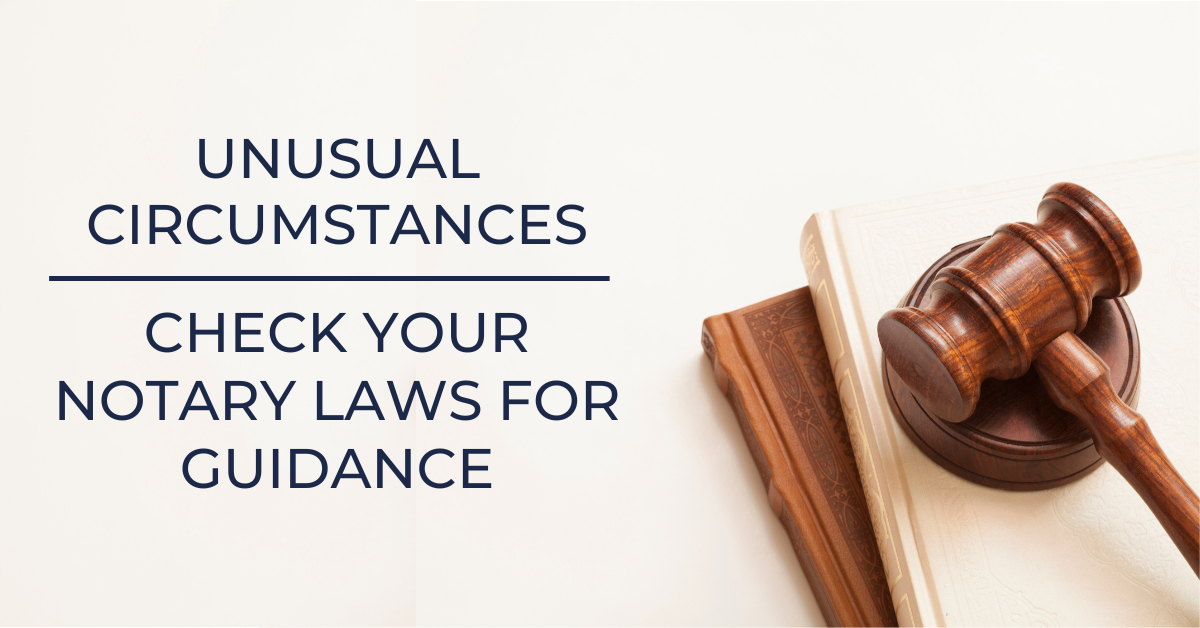Notary Public Underwriters Blog
Unusual Circumstances – Check Your Notary Laws for Guidance!
- Details
- Published: April 10, 2023

From Day One of your new Notary commission, you could receive a request for service that even the most experienced Notary Public has not yet faced. Here are a couple of examples.
Problem: The signer isn’t personally known, and lacks a satisfactory identification document.
Solution: Only in states that specifically allow it (and many do), a Notary may rely on a single “credible witness” who (1) the Notary personally knows, and who (2) personally knows the person whose signature requires notarization. The Notary follows state-specific requirements for completing a notarization using this credible witness method of signer identification.
Some states also address the problem of the Notary not personally knowing a single credible witness. Only where allowed, a Notary may identify the document signer by means of two credible witnesses, neither of whom are personally known by the Notary but both of whom can present their own satisfactory identification to the Notary.
A credible witness (whether it’s one or two of them) appears with the document signer before the Notary, and swears an oath about the identity of the document signer. In some states the Notary must indicate use of a credible witness in the notarial certificate.
Because a Notary administers an oath or affirmation to a credible witness, and that is itself a notarial act, the Notary should create a record book entry for it that is separate from the record book entry created for the document signer’s notarization.
Check your state statutes for specifics on use of a credible witness, starting with whether it’s allowed in your state.
Problem: A person presents a photocopy of a document and wants you to “certify” it by signing it and affixing your Notary seal.
This issue occurs because of the mistaken belief that a Notary stamp on almost anything will “certify” that document or object. A Notary Public cannot simply stamp or emboss their Notary seal on a document or object—a Notary’s seal is used only to complete the Notary’s notarial certificate describing the authorized act that the Notary has performed.
Many states, however, do authorize their Notaries to certify copies of (only) certain types of documents. Though the details vary by state, where authorized a Notary may personally make a copy of an original document, or carefully compare a document copy to the original document, and complete a notarial certificate certifying that the copy is a complete and accurate copy of the original. In quite a few states, Notaries may also certify a paper printout of an electronic record (document)—a very useful form of copy certification.
Notaries in any state allowing these acts should review their laws to determine if the notarial certificate for document copy certification requires the name of the document custodian (the person who possesses the original document being copy-certified). If indeed the document custodian is named in your state’s format for a copy certification notarial certificate, we recommend that you verify that person’s identity (either personal knowledge, or authorized identity documents).
As with every notarial act, create a record book entry for each certification of copy you perform. Have the document custodian sign the entry.
Related Article(s)
“Apostilles ” and “Notary”—How Are They Related?
What Do I Do With My Record Book (Journal) Entry When a Notarization Is Cancelled (Not Completed)?
How to Fix a Bad Notary Seal Impression
